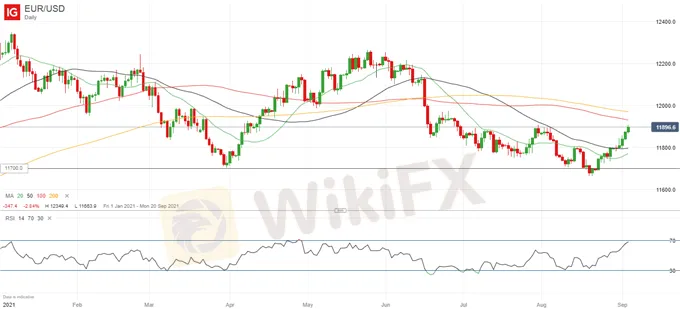简体中文
繁體中文
English
Pусский
日本語
ภาษาไทย
Tiếng Việt
Bahasa Indonesia
Español
हिन्दी
Filippiiniläinen
Français
Deutsch
Português
Türkçe
한국어
العربية
Euro Forecast: EUR/USD Outlook Bearish, Doves to Outvote Hawks at ECB Meeting
Abstract:One after the other, hawkish members of the European Central Bank’s policymaking Governing Council came out last week warning that Eurozone monetary policy will need to be tightened.
EURO PRICE RISK TO THE DOWNSIDE
The European Central Bank‘s Governing Council will almost certainly decide this week not to pre-announce a tightening of Eurozone monetary policy even though a succession of hawkish Council members suggested last week that it should. Given that many EUR/USD traders may have entered long positions in the pair as a result of the hawks’ rhetoric, the principal risk is that it will fall back after Thursdays Council decision on policy is announced.
There were almost too many hawks on the newswires to name but among them were ECB Vice-President Luis de Guingos, Bundesbank President Jens Weidmann and fellow Council members Robert Holzmann and Klaas Knot. They are all worried by a rebound in the Eurozone economy coupled with a sharp rise in inflation to 3%, well above the ECBs target.
Nonetheless, the doves led by President Christine Lagarde are almost certain to maintain their majority on the Council, insisting that the overshoot of the inflation target will be temporary and that there should be no indication of a future tightening of policy just yet. She could also note in passing that data last week showed a surprisingly large fall in the final August reading of the Eurozone services PMI and an unexpected drop in German retail sales year/year in July. That, of course, would be bearish for EUR/USD, especially as it has been advancing strongly since it hit a low at 1.1664 on August 20.
EUR/USD PRICE CHART, DAILY TIMEFRAME (JANUARY 4 – SEPTEMBER 3, 2021)

Lagarde has the opportunity to explain her thoughts at the press conference following the ECB‘s announcement on Thursday but there is also something else that traders need to look out for: the ECB’s economic projections. De Guindos was reported by the Spanish newspaper El Confidenciallast week as saying that the Eurozone “economy is performing better in 2021 than we expected, and this will be reflected in the projections that will be published in the coming days.”
If the projections really do suggest strong growth and inflation, that might give EUR/USD bulls some hope and perhaps limit the downside.
NO EUROZONE RATE HIKE UNTIL 2024
Looking further ahead, it could well be the end of this year before the ECB announcescuts in asset purchases, perhaps involving a move out of its Pandemic Emergency Purchase Program into its Asset Purchase Program and a slowdown in its purchases overall. Moreover, chances are that the ECB will end its QE program only very slowly and that a first interest-rate increase could be as far away as 2024.
Disclaimer:
The views in this article only represent the author's personal views, and do not constitute investment advice on this platform. This platform does not guarantee the accuracy, completeness and timeliness of the information in the article, and will not be liable for any loss caused by the use of or reliance on the information in the article.
WikiFX Broker
Latest News
Germany's Election: Immigration, Economy & Political Tensions Take Centre Stage
WikiFX Review: Is IVY Markets Reliable?
IG 2025 Most Comprehensive Review
ED Exposed US Warned Crypto Scam ”Bit Connect”
Top Profitable Forex Trading Strategies for New Traders
EXNESS 2025 Most Comprehensive Review
Currency Calculator






